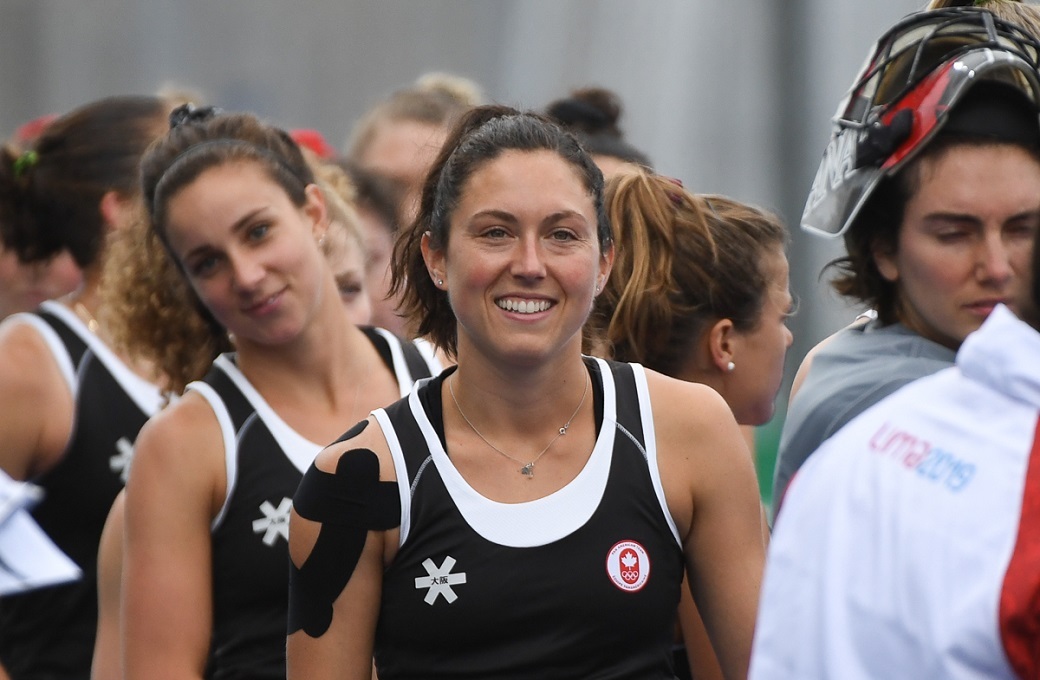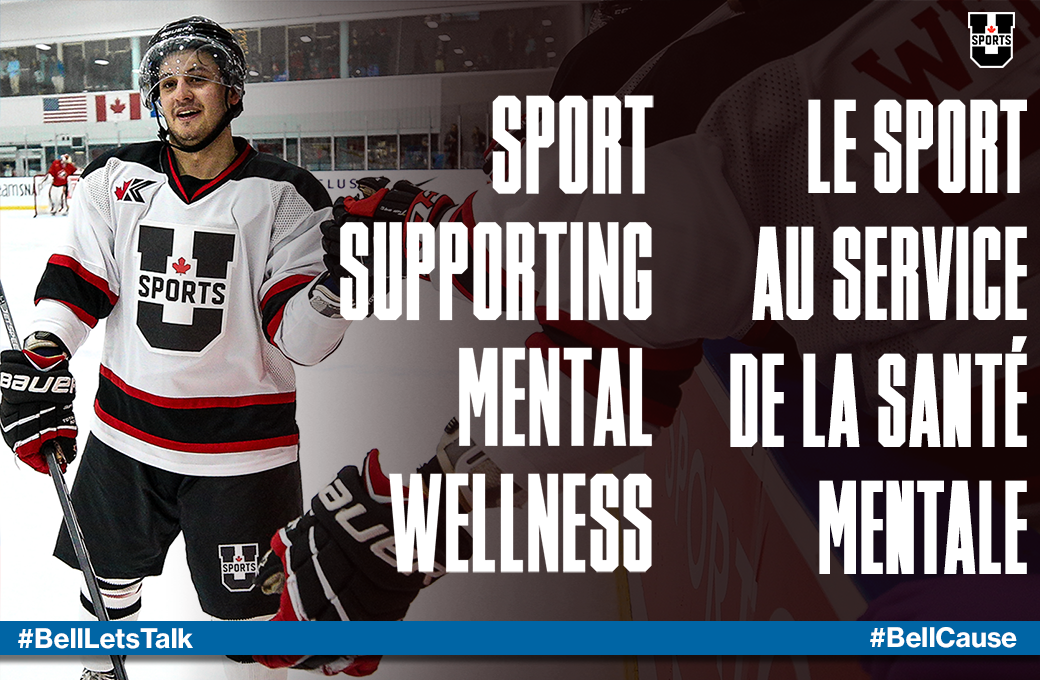Corporate
Field Hockey Canada | Vikes alum Dani Hennig announces retirement from national team


Charlie Pinkerton

On Thursday, Canadians will take part in spreading awareness about mental health as part of the 11th annual Bell Let’s Talk campaign – an initiative that has grown in importance in recent years, especially for student-athletes.
Bell will donating five cents to Canadian mental health programs for each text by Bell customers, and every post on social media made using the Bell Let’s Talk hashtags and filters. Last year, more than $7.7 million was donated to a range of projects that support mental health, raising the all-time donation total to over $108 million.
For the fifth straight year, U SPORTS member institutions are teaming up with Bell to spread the word about available mental health programs and to destigmatize mental health illnesses. And while campaigns like Bell Let’s Talk are widening the dialogue around mental health illnesses, disorders are still ever-present for university students. In 2016, 32 per cent of students were diagnosed or treated for anxiety or depression in the previous year, according to Canada’s most recent National College Health Assessment Survey.
I think the trend is very positive and with Bell Let’s Talk, we’ve changed the attitude and perception of mental well-being and mental health and wellness.
Peter Soberlak and Dr. Carla Edwards are both former elite-level athletes who now work with U SPORTS student-athletes to help them manage mental health issues.
Soberlak was a top player in the Western Hockey League in the late 1980s. He was drafted by the Edmonton Oilers in 1987 and played for the Cape Breton Oilers of the American Hockey League for three seasons. Now he’s an athletic performance advisor at Thompson Rivers University, where he helps athletes manage the mental demand of their lifestyles.
“It’s a very, very difficult job being a student-athlete – it’s very time consuming,” says Soberlak. “Their schedules are very, very busy, and there’s a lot of pressure on them to perform both in the classroom and in the athletic environment.”
Soberlak says he often treats students who deal with anxiety disorders, but that depression isn’t uncommon amongst athletes he works with either.
Edwards is a sport psychiatrist who serves as the mental health representative for the U SPORTS medicine and research science committee. She’s also a member of the Newfoundland and Labrador Sport Hall of Fame and played for Mount Allison University’s women’s volleyball team in the 1990s.
Athletes come to her to help them deal with issues across an entire spectrum: from athletes who deal with in-game anxiety to others who are suffering from more severe impacts from severe mental illnesses.
Soberlak says he thinks it’s important for student-athletes to have available professionals to talk to about the struggles they face as part of their lifestyle.
“The ability for them to sit down and talk and share their feelings and understand, ‘Hey, this is a part of (being a student-athlete) and it’s okay to be overwhelmed and stressed,’” Soberlak says. “(And it) lets (us) find some tools and some skills to help you manage and work on it moving forward.”
I’ve felt often times that I’m sort of the person in the shadows helping them because they don’t want their parents to know that they’re seeing me, or they don’t want their teammates or roommates or their friends to know they’re seeing a psychiatrist because there is still a stigma associated with it.
U SPORTS Game Changers presented by @SherrardKuzz:
— U SPORTS (@USPORTSca) January 24, 2021
Dr. Carla Edwards transitioned from athletics to helping athletes by starting Synergy Sport + Mental Health and serving as High Performance Mental Health Advisor to national sports organizations.#ChaseTheGlory | #ViserHaut pic.twitter.com/J4nTEOgEiN
But as Edwards notes, it’s not always a simple task for athletes to seek out the services that she or Soberlak provide.
“I think the biggest pattern I’ve seen (amongst student-athletes) is a fear of people finding out,” Edwards says. “I’ve felt often times that I’m sort of the person in the shadows helping them because they don’t want their parents to know that they’re seeing me, or they don’t want their teammates or roommates or their friends to know they’re seeing a psychiatrist because there is still a stigma associated with it.”
In spite of this, Edwards said she thinks attitudes about mental illnesses amongst leadership at Canadian universities are changing for the better. As she points out, the University of Guelph has developed a number of mental health supports. Other schools including the University of Calgary, Carleton University and the University of Ottawa have all integrated specialists in the athletic departments to help support student-athletes’ mental health.
Soberlak agrees that mental health support systems for student-athletes are trending in the right direction.
“When I was an amateur and a professional athlete, we didn’t talk about these issues. It was a sign of weakness to go to a coach or a member of an organization and say that you were feeling anxious or overwhelmed, or I’m depressed,” he says. “I think the trend is very positive and with Bell Let’s Talk, we’ve changed the attitude and perception of mental well-being and mental health and wellness.”
This year, all 56 U SPORTS member schools are an official partner of the Bell Let’s Talk campaign.
“I think the initiative of Bell Let’s Talk is opening a lot of doors for people to live more positive, have more happy and positive experience as student-athletes,” Soberlak says. “And that’s what our goal is.”
Top 10 Tips to take care of your mental health
1. Connect With People
Spend time with people who can inspire you. Stay in touch with family and friends. Regularly connect with them.
2. Laugh A Little
Laughter triggers biological mechanisms that improve both your physical and mental health. If you’re feeling brave try laughter yoga
3. Remember to Breathe
Taking a few minutes to take some deep, cleansing breaths can relax muscles, settle the mind, melt stress, and shift mental gears. A simple concept, but often forgotten when we are under stress.
4. Take a mindful moment
Make sure you are looking after yourself and take time to understand how and why pressure affects you. When stress increases, take time to tap into your senses- ground yourself in your surroundings. This will help you focus, tune into the present, and organize your thoughts
5. Be Present
Stay in the moment and try not to dwell in the past or look too far ahead into the future. As a student-athlete it is easy to get overwhelmed, so take it day by day and focus on constant improvement.
6. Practice positive self-talk
Positive self-talk is the key to both academic and athletic success! That little voice inside your head should be building you up, not knocking you down! Be kind to yourself.
7. Restore your brain and body
Don’t neglect your physical health. Eat a well-balanced diet and get enough sleep. Making time for sleep and relaxing allows your body to recover!
8. Switch Mental Tracks
Stimulating your senses when feeling distressed can change the parts of your brain that are being accessed- resulting in decreased distress and better emotional control. For example- holding something rough (or smooth) in your hands, using a fidget, or coloring
9. Seek Out Awe
Feeling inspired can increase your personal or professional satisfaction
10. Unplug
Consciously take time to unplug, and put aside your technology
Further reading:
National Standard of Canada for Mental Health and Well-Being for Post-Secondary Students
"I wasn’t sure anybody would want me after I hit rock bottom. I saw myself more as a liability than an asset to a team."
— U SPORTS (@USPORTSca) January 30, 2019
👂to Krista Van Slingerland, founder of @mentally_tough and former @uOttawaGeeGees ⛹️♀️ talk about her mental health journey ⬇️#BellLetsTalk pic.twitter.com/1wyfpDPkHh
Corporate
Field Hockey Canada
